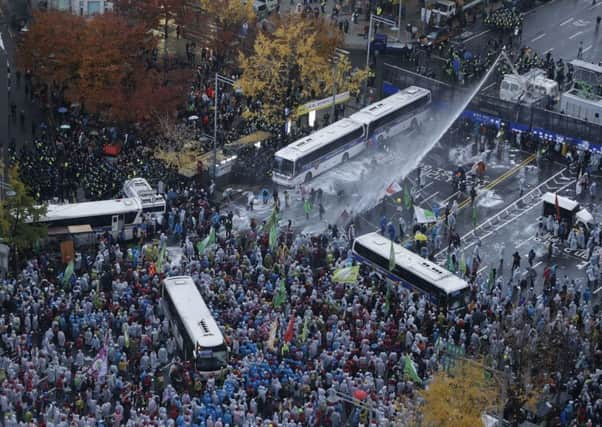Police fire tear gas at Seoul demonstrators


About 80,000 people were expected to turn up for the downtown rallies that stretched into the evening, according to a police official.
The marches, organised by labour, civic and farmers’ groups, brought together protesters with a diverse set of grievances against the government of conservative president Park Geun-hye, including her business-friendly labour policies and a decision to require middle and high schools to use only state-issued history textbooks starting in 2017.
Advertisement
Hide AdAdvertisement
Hide AdDemonstrators, many of them masked, carried banners and chanted “Park Geun-hye, step down” and “No to layoffs” as they occupied a major street. Police created tight perimeters with their buses to block them. Protesters tried to move some of the buses, and police, wearing helmets and body armour, responded by firing tear gas and water cannons at them.
Some protesters fought back by hitting police officers stationed on the top of the buses with poles. Others attacked the buses with sticks and rocks, or spray-painted anti-government slogans on them.
Police said it was likely some people had been injured, but could not give a figure.
Earlier in the day, members of the Korean Confederation of Trade Unions, an umbrella labour union, clashed with police who unsuccessfully tried to detain KCTU president Han Sang-goon during a news conference. A Seoul court had issued an arrest warrant for Han when he failed to appear in court after being indicted for his involvement in organising a protest in May that turned violent.
“If lawmakers try to pass the [government’s] bill, that will make labour conditions worse, we will respond with a general strike and that will probably be in early December,” said Han, moments before police moved in and he fled as his colleagues blocked the officers.
Police did not say how many people turned up for the protest, but said the crowd was probably the largest at a demonstration in Seoul since May 2008, when about 100,000 people poured onto the streets to protest over the government’s decision to resume US beef imports amid lingering mad cow fears.
Workers’ groups have been denouncing government attempts to allow more freedom for companies in laying off workers, which politicians have said would be critical in improving a bleak job market for young people.
Critics also said that the state-issued history textbooks, which have not been written yet, would be politically driven and might attempt to whitewash the brutal dictatorships that preceded South Korea’s bloody transition toward democracy in the 1980s.
Advertisement
Hide AdAdvertisement
Hide AdPark is the daughter of assassinated military dictator Park Chung-hee, who ruled South Korea in the 1960s and 1970s, and whose legacy as a successful economic strategist is marred by records of severe oppression.